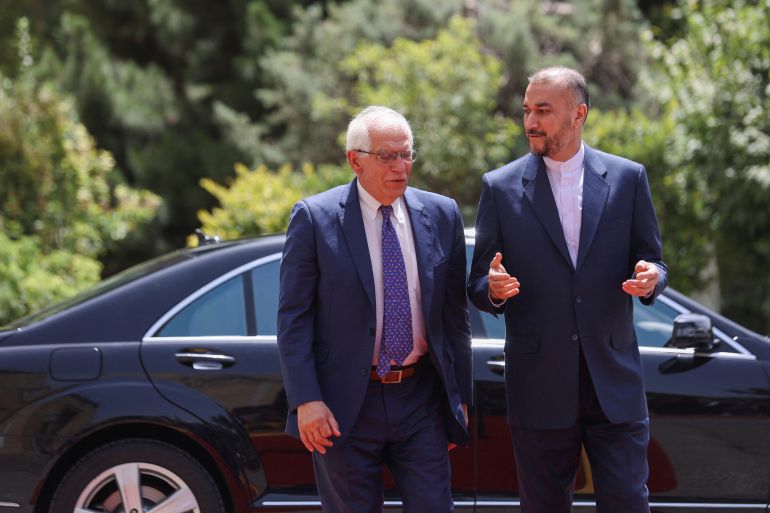Iran and EU agree to restart nuclear deal talks on Borrell visit
Indirect talks between Iran and the US are set to resume after the EU foreign policy chief visits Tehran to resolve the impasse.

Tehran, Iran – Iran and the European Union have agreed during a visit by the bloc’s foreign policy chief to resume nuclear talks with the United States that have stalled since March.
Iranian Foreign Minister Hossein Amirabdollahian and the EU’s Josep Borrell announced during a news conference following a “long but positive” talk on Saturday that they have agreed that indirect talks between Tehran and Washington to restore their 2015 nuclear accord will restart within days.
Keep reading
list of 4 itemsTurkey foils alleged Iran plot to kill Israelis in Istanbul
Two Iranian aerospace staff ‘martyred’: State media
Iran’s currency hits new record low amid nuclear deal uncertainty
Amirabdollahian told reporters that, for Iran, what matters most is that it can enjoy the full economic benefits that it was promised under the original deal.
“Whatever issue that can [negatively] impact Iran’s economic benefits will not be agreeable” for Iran and the government of President Ebrahim Raisi, he said.
“We hope, specifically, that the American side will this time realistically and fairly engage in committed and responsible acts towards reaching the final point of an agreement.”
Borrell also welcomed the resumption of the talks, saying a restored nuclear deal would benefit the region and the world.
He also said he would like to return to Iran in the future, presumably when US sanctions are lifted, to further discuss the “high potential” of expanding trade and energy ties between Iran and the EU.
The restarted talks will be aimed at “resolving the last outstanding issues”, he said in a series of tweets following the news conference, without elaborating.
Borrell and his deputy Enrique Mora arrived in Tehran late on Friday and met Amirabdollahian and chief nuclear negotiator Ali Bagheri Kani on Saturday. Borrell was also scheduled to have a meeting with Iran’s security chief Ali Shamkhani later on Saturday.
Iran and the US – which unilaterally abandoned the accord in 2018 under then-President Donald Trump and imposed harsh sanctions – had been in an impasse over how to revive the Joint Comprehensive Plan of Action (JCPOA) – as the nuclear deal is formally known – since March.
As the issue of whether a “foreign terrorist organisation” designation on Iran’s Islamic Revolutionary Guard Corps (IRGC) will be lifted remains a major sticking point, both sides have publicly continued to call on the other to make concessions.
Amirabdollahian announced last week that Iran has made a new proposal to the US to move the talks forward. Foreign ministry spokesman Saeed Khatibzadeh did not give the details, but said the new offer was conveyed through the EU and two foreign ministers that he did not name.
Borrell and Mora’s visit comes days after they had a meeting with Robert Malley, the US special envoy for Iran, during which Malley “reiterated firm US commitment to come back to the deal”, according to a tweet by Mora.
France, one of the signatories of the JCPOA, on Friday urged Iran to take advantage of the EU leaders’ visit and conclude the talks now “while it still remains possible”.
The US and its European allies that signed the deal – France, Germany and the United Kingdom – earlier this month introduced a resolution at the board of the International Atomic Energy Agency (IAEA) to censure Iran over its nuclear advances, which was passed.
Shortly after, Iran took down 27 monitoring cameras of the IAEA that were subject to the JCPOA, and began installing advanced IR-6 centrifuges at its Natanz and Fordow sites, saying it will not bow to pressure.
IAEA Director General Rafael Grossi has warned that the move poses a threat to the agency’s continuity of knowledge and could deal a “fatal blow” to efforts to revive the JCPOA if not remedied.
Grossi’s request to make a trip to Tehran to discuss the monitoring issue has not been granted so far.
Iran is now enriching uranium up to a purity of 60 percent, but maintains that it will never seek a nuclear weapon.